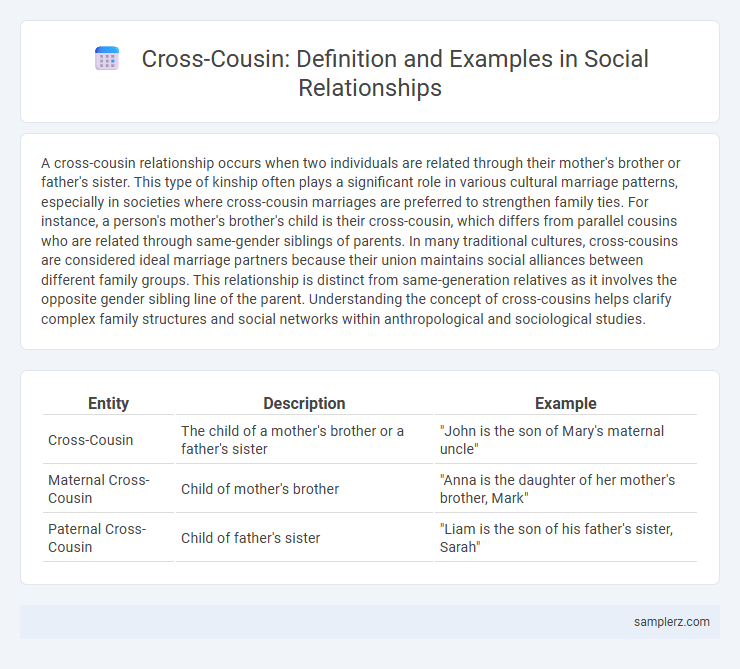A cross-cousin relationship occurs when two individuals are related through their mother's brother or father's sister. This type of kinship often plays a significant role in various cultural marriage patterns, especially in societies where cross-cousin marriages are preferred to strengthen family ties. For instance, a person's mother's brother's child is their cross-cousin, which differs from parallel cousins who are related through same-gender siblings of parents. In many traditional cultures, cross-cousins are considered ideal marriage partners because their union maintains social alliances between different family groups. This relationship is distinct from same-generation relatives as it involves the opposite gender sibling line of the parent. Understanding the concept of cross-cousins helps clarify complex family structures and social networks within anthropological and sociological studies.
Table of Comparison
| Entity | Description | Example |
|---|---|---|
| Cross-Cousin | The child of a mother's brother or a father's sister | "John is the son of Mary's maternal uncle" |
| Maternal Cross-Cousin | Child of mother's brother | "Anna is the daughter of her mother's brother, Mark" |
| Paternal Cross-Cousin | Child of father's sister | "Liam is the son of his father's sister, Sarah" |
Understanding Cross-Cousin Relationships in Social Contexts
Cross-cousin relationships occur when individuals are related through opposite-gender siblings of their parents, such as the child of a father's sister or a mother's brother. In many social and cultural contexts, cross-cousin marriages are preferred or culturally significant, often reinforcing kinship ties and social alliances. Understanding these relationships helps clarify family structures, inheritance patterns, and social obligations within communities.
Cross-Cousin Marriages: Traditions Around the World
Cross-cousin marriages, where individuals marry the child of their mother's brother or father's sister, are a common tradition in various cultures, including South India, the Middle East, and parts of Africa. These unions often strengthen family alliances and preserve property within the extended kinship network. In Tamil Nadu, for instance, cross-cousin marriage between a man and his maternal uncle's daughter is socially preferred and legally accepted, reflecting deep-rooted cultural norms.
Cultural Significance of Cross-Cousin Unions
Cross-cousin unions, where individuals marry their mother's brother's children or father's sister's children, hold profound cultural significance in many societies, serving to strengthen familial alliances and preserve kinship ties. These marriages often facilitate social cohesion by maintaining property within the extended family and reinforcing group identity. In various indigenous and tribal communities, cross-cousin marriages are preferred or prescribed, reflecting deep-rooted social norms and contributing to cultural continuity.
Social Roles of Cross-Cousins in Family Structures
Cross-cousins, the children of a brother and sister, often hold significant social roles in family structures by serving as preferred marriage partners, reinforcing alliances between kin groups. In many societies, cross-cousin marriage strengthens social cohesion and maintains property within extended families. This practice underscores the importance of lineage and reciprocal obligations, shaping social status and inheritance patterns in communities.
Cross-Cousin Relationships and Kinship Systems
Cross-cousin relationships, common in kinship systems such as the Iroquois and Dravidian, involve children of a brother and sister, fostering alliances between distinct family lines. These unions often serve to strengthen social cohesion and maintain lineage balance by promoting marriage between cross-cousins rather than parallel cousins. Anthropological studies highlight that cross-cousin marriage patterns influence inheritance rules, residence post-marriage, and the distribution of social responsibilities within communities.
Cross-Cousin Examples in Indigenous Communities
Cross-cousin relationships, such as marriage between the children of a mother's brother and a father's sister, play a significant role in many Indigenous communities, including the Iroquois and the Yanomami. These relationships are culturally preferred and help strengthen kinship ties and social cohesion within the tribe. Anthropological studies highlight how cross-cousin marriage functions to balance alliances and maintain community stability.
Cross-Cousin Bonds: Strengthening Social Networks
Cross-cousin bonds, such as the relationship between a person and their mother's brother's child, play a crucial role in strengthening social networks by fostering alliances across extended family groups. These connections often facilitate cooperative behaviors, resource exchange, and mutual support within communities, enhancing social cohesion. Anthropological studies reveal that cross-cousin marriages and interactions help maintain balanced kinship ties and promote social stability in various cultures.
The Impact of Cross-Cousin Ties on Social Alliances
Cross-cousin relationships, where individuals marry the child of their parent's opposite-sex sibling, significantly strengthen social alliances by reinforcing kinship bonds and fostering cooperation between families. In many cultures, these ties facilitate resource sharing, political support, and conflict resolution, enhancing group cohesion and collective stability. Anthropological studies highlight that cross-cousin marriages create durable networks crucial for social integration and alliance formation within communities.
Cross-Cousins in Modern Society: Evolving Perspectives
Cross-cousins, the children of a brother and a sister, often hold unique positions in modern social relationships, where traditional boundaries blur amid evolving cultural norms. In many societies, cross-cousin marriages historically reinforced alliances, yet contemporary views increasingly emphasize individual choice and social compatibility. Shifting perspectives highlight how these relationships navigate the balance between heritage and personal autonomy in diverse communities.
Navigating Social Norms: Acceptability of Cross-Cousin Relationships
Cross-cousin relationships, where individuals marry the children of opposite-sex siblings, are socially acceptable in many Indigenous and South Asian cultures due to their role in reinforcing family alliances and kinship structures. These relationships differ from parallel cousin marriages, often seen as less acceptable or taboo in certain societies. Understanding the cultural context is crucial for navigating social norms surrounding cross-cousin relationships and recognizing their significance in maintaining social cohesion.

example of cross-cousin in relationship Infographic
 samplerz.com
samplerz.com